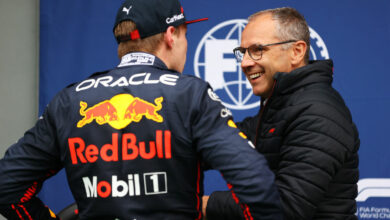Revitalizing Formula 1: David Croft’s Insights on Streamlining Rules for a Thrilling Sport
Sky F1 Commentator Calls for Simpler Rules and Strategic Schedule Changes to Elevate Formula 1 Entertainment
David Croft’s Formula 1 Insights: Simplifying Rules for a Better Sport
David Croft, the esteemed Sky F1 commentator and a notable voice within the Formula 1 community, has been an advocate for positive changes within the sport. In recent times, Croft has put forward several intriguing ideas that could potentially reshape the world of Formula 1, all aimed at enhancing the overall experience for fans, drivers, and teams alike.
One of Croft’s recent propositions involves the Sprint Race format, which he envisions as a potential separate championship on its own. This innovative concept could inject an added layer of excitement into the racing season, potentially granting emerging talents more opportunities to shine and demonstrate their prowess on the track.
“I think a simplification of the rules, because they’re getting a bit too complicated, we need to find a way to simplify it and just put the show first.
“Ban blue flags, because, if you’re good enough to be leading a race, you’re good enough to pass another driver not leading the race because they’re last without them having to jump out of the way – it might make things a lot more interesting as well.
“You could do that without any investment in the sport, without any engineering challenges whatsoever. That’s a masterstroke, a stroke of a flag, waving a flag, you could get rid of something that I just think is unnecessary.
“Other motorsport categories don’t have blue flags. But it’s difficult, we have a tradition and heritage in Formula 1 that you don’t want to upset too much.”
However, Croft’s insights don’t stop there. In a passionate plea, he has urged for the simplification of the sport’s rules. Expressing his dissatisfaction with the often complex and convoluted regulations imposed by the FIA, Croft has raised a valid point: Do we really need all these intricate rules?
One particular rule that Croft has squarely addressed is the waving of the Blue flag. Traditionally used to signal slower cars to let faster competitors pass, Croft argues that this rule might be unnecessary. His rationale stems from the belief that a skilled and fast driver should inherently know how to navigate past a slower counterpart, rendering the Blue flag obsolete. By eliminating this rule, Formula 1 could potentially create more organic and dynamic racing scenarios, without the need for cautionary signals.
Croft’s stance becomes even more intriguing when he points out that other motorsport categories do not employ Blue flags. This raises a pertinent question: Does Formula 1 cling too tightly to tradition, potentially hindering its own progress? Croft believes that the sport’s rich heritage should not impede necessary modernization. He proposes a simple solution: let go of the Blue flag, allowing the sport to evolve while still honoring its legacy.
“Because there are a fair amount of fans who don’t like the Sprints at all.
“But, maybe, if you had the Sprint at the start, then the rest of the weekend is a Grand Prix weekend, that might overcome that a little bit, and then try not to tinker too much, because, by and large, we’ve got a really good spectacle.”
Another proposal from Croft centers on rearranging the Sprint race within the race weekend schedule. Recognizing that not all fans are on board with the current placement of the Sprint race, he suggests moving it to a different slot. This change could enhance the overall flow of the weekend for both avid supporters and casual viewers, ensuring that the action-packed Sprint race receives the attention and anticipation it deserves.
However, Croft’s vision for Formula 1 doesn’t involve a complete overhaul. Instead, he emphasizes the importance of incremental changes that would enhance the sport without altering its core essence. He underscores the fact that Formula 1 is already a captivating spectacle loved by millions across the globe. By refining the rules and optimizing the schedule, the sport could shine even brighter while preserving its allure.
In Croft’s own words, “It’s about finding that delicate balance between tradition and evolution.” His insights serve as a reminder that Formula 1 is not just a competition but also a show, an art form that requires thoughtful adjustments to maintain its magic.


